Buying an EV to save money isn’t always as straightforward as it seems, kind of like choosing a Ferrari SUV to carry lumber for your next home renovation project. Sure, it looks sleek, feels futuristic, and might even make the neighbors wonder where your income comes from.
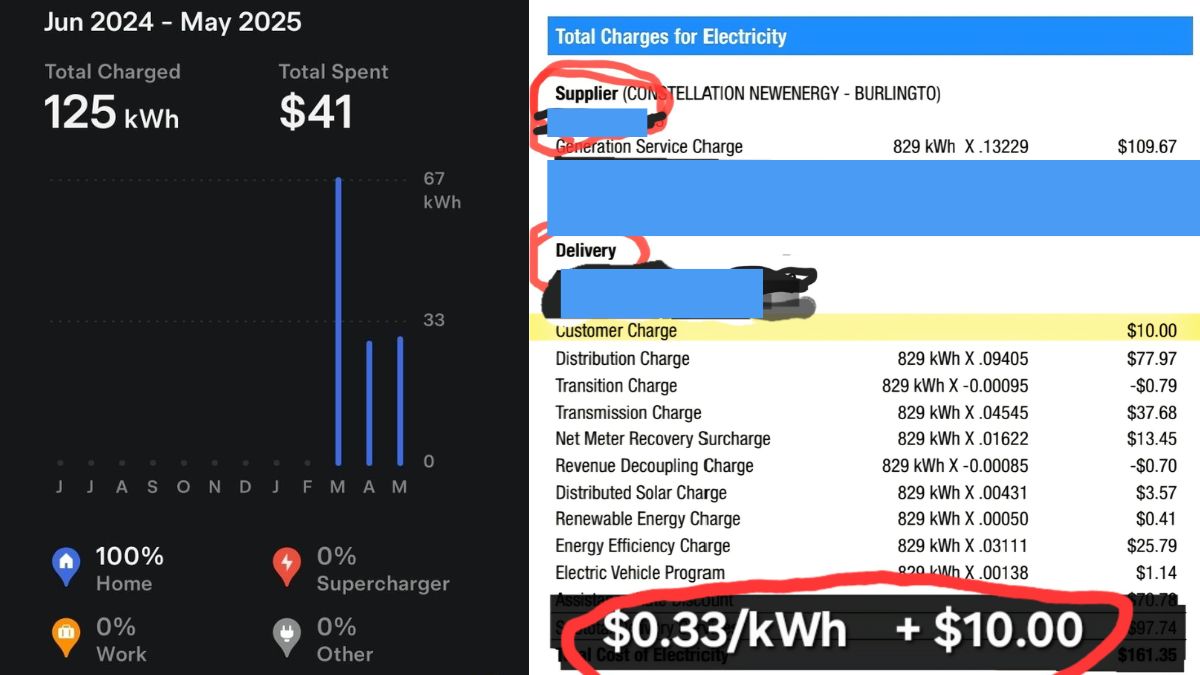
But it’s a calculated game of kilowatt-hour economics, tire pressure, grid rates, and meteorology. One wrong move, a high electricity rate, a poor charging setup, or a New England cold snap, and your promised savings evaporate faster than any gas tank.
Which is an issue one Facebook user found out the hard way. He took his frustrations to a Tesla Model Y owners group:
“Anyone else pay more for electricity than gasoline? I paid $41 to charge at home. My car only has 282 miles on it.
Here in Boston, gasoline is only $2,60/gal. Electricity (via Eversource) is $0.33/kWh + a $10 fee per customer.
It actually just went down 2 cents.
However, we do get free chargers, installation, and panel upgrades, if needed (maximum $1,700). Hence, the Electric Vehicle Program charge that EVERYONE has to pay, whether they own an EV or not.
Massachusetts also gives EV buyers $3,500 to $6,000 toward any EV under $55,k
Note: We do not have variable rates. The rate is fixed 24/7.
Let us all know how your area fares. ”
That’s the EV cost paradox in action. The idea is that driving an electric car should save you money. But in Boston, it costs $41 to drive 282 miles, that’s about 33 cents a mile.
It’s not a deal-breaker, just a reminder that real-world costs can vary depending on where and how you charge.
You could run a Toyota Corolla, getting 35 mpg at $2.60 a gallon, for $0.074 per mile. That’s less than a third the cost per mile, and it doesn’t require you to worry about grid load balancing, off-peak hours, or whether your garage has the thermal insulation of a space shuttle.
Boston EV Charging Costs: Electricity Rates, Monthly Bills & Savings Programs
- As of June 2025, Boston residents pay an average of 28.27 cents per kilowatt-hour (kWh) for electricity, which is significantly higher than the national average of 16.15 cents per kWh. This results in an average monthly electric bill of approximately $154.01 for Boston households.
- Charging an EV at home in Boston can be cost-effective. For instance, if your electricity rate is around 14 cents per kWh, and your Level 2 charger dispenses electricity at a rate of 6 to 8 kWh, you can expect to pay about $1.00 per hour of charging. This translates to approximately $65 per month, depending on your driving habits and electricity rates.
- Public charging rates in Massachusetts vary. The city of Boston's municipal ChargePoint stations charge $0.25 per kWh, offering a more affordable option for EV owners. However, the average cost at public charging stations across the state is about $0.52 per kWh, making it one of the more expensive states for public EV charging.
- Programs like National Grid's Off-Peak Charging Program provide financial incentives for EV owners to charge their vehicles during off-peak hours. Participants can earn $0.05 per kWh for charging between 9:00 p.m. and 1:00 p.m. from June to September, and $0.03 per kWh during the same hours from October to May. These rebates are applied as credits on the following month's electric bill.
In Boston, the numbers tell a more complex story, not because anything went wrong, but because incentives and utility rates sometimes overlap in ways that blur the financial picture.
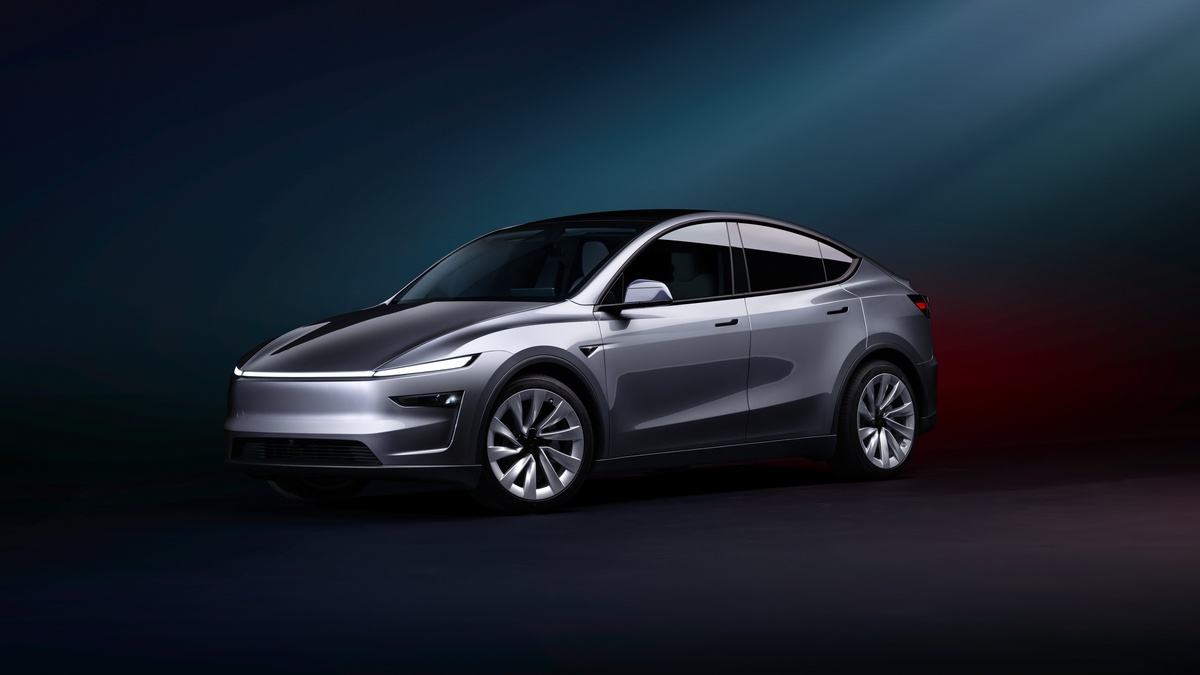
It's a reminder that even well-executed transitions come with a learning curve.
But not all EV owners are suffering.
“I’m in PA and my electricity is $.18 a kWh. Gas in our area is $3.22, so we’ve got some pretty significant savings.”
Commented another user.
“I guess in Boston, you’re driving an EV to feel good, not save money. Sorry.”
Electricity costs vary so wildly across the country that the EV savings story is no longer national, it’s local, even block-by-block. In parts of Pennsylvania or Texas, your EV can pay for itself in a matter of years. In Massachusetts?
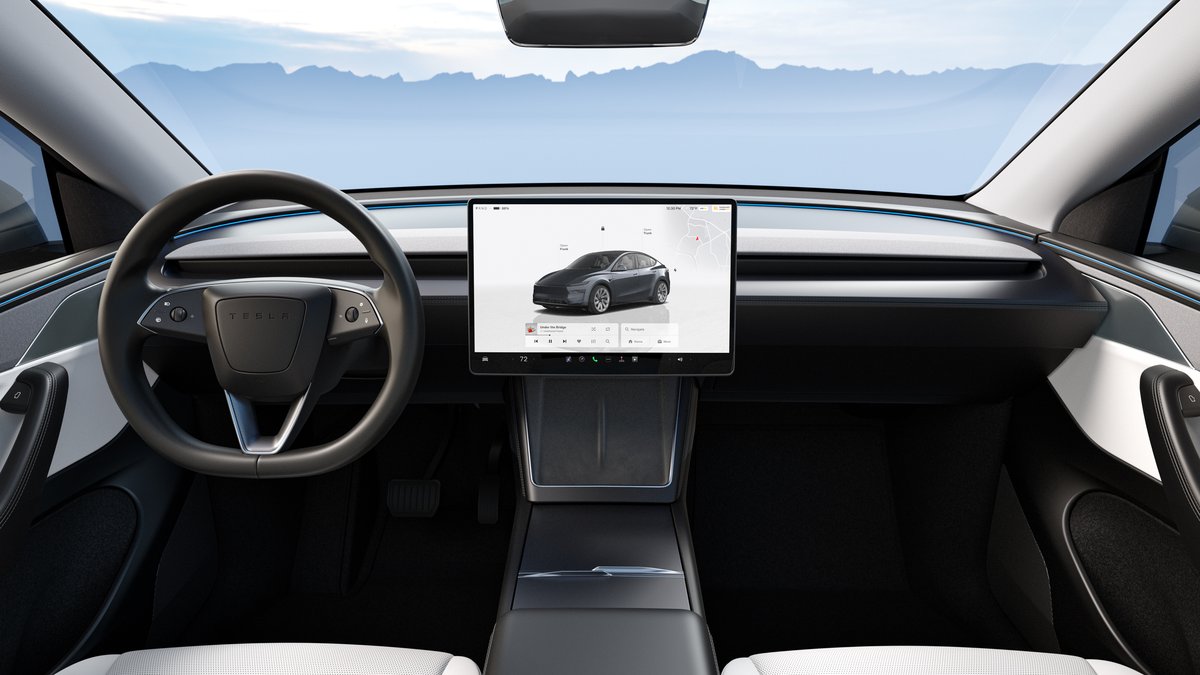
You’re basically subsidizing the grid while driving around with a clean conscience.
Even more surreal: our Boston-based driver isn’t new to the game.
“Traded my 2024 in for a 2025, with only 1,700 miles. Now I’m trading in my 2025 with under 300 miles on it for a 2026,”
He knows what he’s getting into.
He just doesn’t care. He loves the experience, the tech, and never having to sniff around a gas pump like a lost dog. This isn’t someone trying to win the frugal commuter Olympics. This is a man who finds joy in the routine of silent, high-tech mobility, even if the dollars make less sense than a Cybertruck on a racetrack.
California EV Charging Rates & Gasoline Comparison: Off-Peak Savings Explained
California owners chimed in with their own version of grid roulette.
“I pay $0.22 per kWh from 9 pm to 4 pm the following day, and peak of $0.65 per kWh during a 4 pm to 9 pm window,” said one.
“Gas averages $5+ here, so it’s still cheaper to go electric.”
So now, EV ownership has become a part-time job, amateur energy arbitrage during off-peak hours, studying power utility graphs, etc. Miss the charging window and your savings go up in the same smoke EVs are supposed to prevent.
2025 Tesla Model Y Juniper Specs: Range, Performance, Dimensions & Pricing
- The Model Y offers varying ranges and acceleration times across its trims. The Long Range AWD variant provides an EPA-estimated range of up to 320 miles and accelerates from 0 to 60 mph in approximately 4.6 seconds. The Performance model boasts a quicker 0-60 mph time of 3.5 seconds and a top speed of 155 mph.
- All trims come equipped with a 75 kWh battery pack. The Long Range AWD model delivers around 384 horsepower and 375 lb-ft of torque, while the Performance variant increases output to approximately 456 horsepower and 497 lb-ft of torque.
- The Model Y measures 187 inches in length, 75.6 inches in width, and 64 inches in height, with a wheelbase of 113.8 inches. It offers a maximum cargo capacity of 76.2 cubic feet when the rear seats are folded down.
- The starting MSRP for the 2025 Model Y is approximately $42,990 for the base Rear-Wheel Drive model. The Long Range AWD starts around $47,990, and the Performance trim is priced at about $52,490.
And then there’s the weather. Cold climates are kryptonite to EV efficiency. In a Boston winter, an EV’s range can drop 30% just keeping the battery and cabin warm.
That means more frequent charges, even higher costs, and more time tethered to the wall instead of, you know, driving. It’s not just a matter of owning an EV, it’s managing it like a delicate science project. Keep tire pressures optimal. Precondition your battery. Pray the grid stays stable during a blizzard.
Yet for all this complexity, the core truth endures: people aren’t just buying EVs to save money. They’re buying freedom from gas stations, a smoother ride, and yes, a ticket to the future, even if it’s a bit overpriced.
What’s the highest rate you’ve paid to charge your EV? Let us know in the comments below.
Image Sources: Tesla Newsroom
Noah Washington is an automotive journalist based in Atlanta, Georgia. He enjoys covering the latest news in the automotive industry and conducting reviews on the latest cars. He has been in the automotive industry since 15 years old and has been featured in prominent automotive news sites. You can reach him on X and LinkedIn for tips and to follow his automotive coverage.


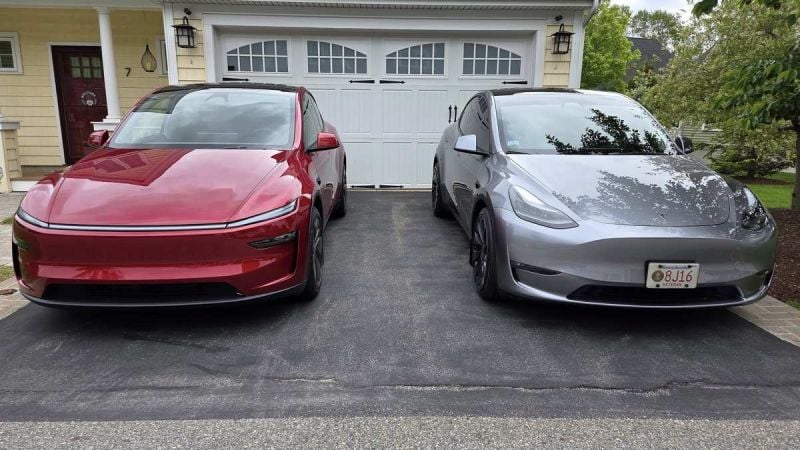




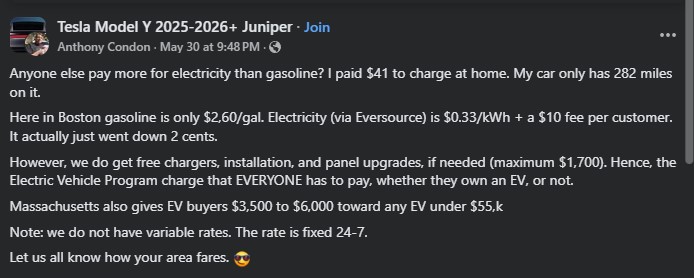



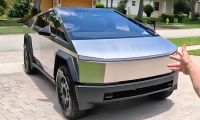

Comments
Great report, Noah. I live…
Permalink
Great report, Noah. I live in metro Boston, and I know the price per mile very well for the various vehicle options. In my town, there is no time-of-use discount program. Eversource does not offer one. The stations near me offer gas at about $2.67 to about $2.85 right now. My electricity rate is $0.32/kWh, and the closest DC charger has a price of $0.58/kWh. The lowest cost per mile vehicle type by far is hybrid-electric vehicles. Our Toyota hybrid Venza gets 42 MPG and has a cost per mile of energy lower than any battery-electric vehicle on sale.
Fortunately I have…
Permalink
In reply to Great report, Noah. I live… by John Goreham
Fortunately I have solar panels on my house. I try to only charge on sunny days. When I spoke to Eversource NH they said they do have off hour charging but I could not since I already have a 2nd meter for solar.
On a side note why has Eversourse donated our money to political campains?Contributions
$217,689
Lobbying
in 2024
$370,000
in 2023
$440,000
That’s awesome you’re using…
Permalink
In reply to Fortunately I have… by Gerry (not verified)
That’s awesome you’re using solar to charge such a smart way to save and stay green!
Here in San Francisco, the…
Permalink
In reply to Fortunately I have… by Gerry (not verified)
Here in San Francisco, the gas is about $5/gal, electricity time of use plan plus discount cost $0.20 per kwh. The subaru Forrester I drove can get nowhere near 30 mph. EV is a no-brainer for me.
Uh, are you forgetting…
Permalink
In reply to Here in San Francisco, the… by Ethan (not verified)
Uh, are you forgetting delivery charges? Electricity at off peak rates in the bay area is like 32c+. It's 65c during peak.
Assuming you mean 30 mpg…
Permalink
In reply to Here in San Francisco, the… by Ethan (not verified)
Assuming you mean 30 mpg. That’s sad. My wife gets 33 mpg in her legacy, same engine. My wrx got 32 mpg. My bmw gets 34 mpg. Maybe your just not good at driving
Thanks for sharing your…
Permalink
In reply to Great report, Noah. I live… by John Goreham
Thanks for sharing your local insights! It’s great to hear about the hybrid’s efficiency in your area definitely shows how costs can vary regionally. Appreciate the thoughtful comment man!
My non hybrid gasoline only…
Permalink
In reply to Great report, Noah. I live… by John Goreham
My non hybrid gasoline only Mitsubishi Mirage has better mileage, despite it cost twice less than any hybrid
YA but you are driving a…
Permalink
In reply to My non hybrid gasoline only… by Alexey Zharikov (not verified)
YA but you are driving a Mitsubishi how embarrassing you know they made the planes that attacked Pearl Harbour
I don't understand, how is…
Permalink
In reply to Great report, Noah. I live… by John Goreham
I don't understand, how is it possible to charge 75 Kwh battery with 125 kwh of electricity. This seems like are 2 separete charges of the Tesla. If that's the case, you should have a range of more then 500 miles.
Also, I don't think it is fare to compare the gas mileage of a Toyota Corolla. It should be compared with a vehicle that is close to the performance of the Tesla model Y.
Let's say similar hp and 0-60 mph.
You are comparing apples with oranges.
This article is nonsense…
Permalink
In reply to I don't understand, how is… by Penata (not verified)
This article is nonsense math. According to the numbers he pays $0.33/kWh, but he claims it cost him $0.33/mile. That means his car gets 1 mile per kWh. Nonsense.
In that case the submission…
Permalink
In reply to I don't understand, how is… by Penata (not verified)
In that case, the submission-priced Toyota Sienna also beats the Tesla at those rates. It's ridiculous that electricity is allowed to be dispensed at those eye-watering rates. There is definitely a lot of negatives given how many subsidies gas/petroleum extraction gets throughout the supply chain, unlike electricity generation.
I agree with you 100%. Im…
Permalink
In reply to I don't understand, how is… by Penata (not verified)
I agree with you 100%. Im not pointing fingers at this publication, but there are tons of articles like this with worst case scenarios and bad assumptions used to calculate comparisons which I blame for a lot of folks having a negative opinion of electric vehicles. If authors dont want to drive one, fine thats your choice, but dont smear them. In FL panhandle here, my home charging costs for M3 are half of the gas costs of my old Ford Focus ST (4 cylinder turbo). Not to mention savings on oil changes, belts, chains, flux capacitors, etc related to an ICE
With an electricity rate of…
Permalink
In reply to Great report, Noah. I live… by John Goreham
With an electricity rate of. 32/kwh the model y is almost at pair (.07/m) with your Venza (.066/mi).
Given I'm no Tesla fan.
In my work truck (E-Transit vs regular transit for a better apples to apples). In your area it would be .12/mi electric or .17/mi gas.
Now where I'm at, electricity is .11/kwh and gas is about $3, so the savings are much more significant.
Somethings off. A Y gets…
Permalink
In reply to Great report, Noah. I live… by John Goreham
Somethings off.
A Y gets about 2.5 miles per kwh.
At $.28/kwh that's a bit above $.11/mile.
One thing that perplexes me…
Permalink
In reply to Great report, Noah. I live… by John Goreham
One thing that perplexes me is this. If I have an electric car it should go the same distance as a gallon of gas. That only makes since. 300 miles is nothing!! Where's the genius in only going 300 miles. It should be the same as gasoline or pretty darn close to it. Just an opinion
Model Y gets approximately 4…
Permalink
In reply to Great report, Noah. I live… by John Goreham
Model Y gets approximately 4 miles per kWh. So, in normal driving conditions, he would have gotten 500 miles out of 125 kWh. Looks like he was testing his 0-60 :-)
Per mile cost is $0.0825. for a hybrid that gets 42mpg, at $3.00 per gallon, $0.0714. For small ICE with 32mpg, $0.9375. Given the low cost of maintain due to the lack of any ICE engine, EVs are still very competitive cost wise.
A model Y gets about 4mi to…
Permalink
In reply to Great report, Noah. I live… by John Goreham
A model Y gets about 4mi to a kWh. At your rate that's about $3.20 to go the 42mi you get on a gallon of gas. They are close, but you're right about the venza being cheaper while fuel is so cheap. I have issue with you suggesting no electric cars that can beat that and suggest the operating costs aren't as gas favoured as you suggest.
Seems ridiculously high…
Permalink
In reply to Great report, Noah. I live… by John Goreham
Seems ridiculously high. Here in Atlanta Georgia Power offers an EV rate that’s about seven cents per kilowatt hour between 11 PM and 7 AM. My Mercedes gets about 4 mi./kw hour. so for seven dollars I can go about 400 miles. I don’t know any gas car that can beat that.
Anyone who invested in two…
Permalink
In reply to Great report, Noah. I live… by John Goreham
Anyone who invested in two Teslas, when there are many similarly performing EVs from other brands that are available at a fraction of the cost, was never really focused on saving money through their EV ownership. So why publish an entire article comparing costs of gas vs electricity to power your automobile?
So that $41 was for 125 kWh,…
Permalink
So that $41 was for 125 kWh, at the rated efficiency of 22.6 kwh / 100 miles, that gets you 560 miles or 7.7 cents / mile, very similar the the corrola quoted but without having to worry about fluid maintenance.
My Model 3 LR rwd real world efficiency is closer to 21.0 kWh / 100 miles in Houston with $0.13 / kWh electricity (which has SPIKED the last few years, when I bought the car it was around $0.08 / kWh), I'm paying a but less than $0.03 / mile, which is negligible compared to the Texas EV penalty annual registration fee (equivalent to electricity cost for driving 7700 miles at current rates).
Thanks. The math wasn't …
Permalink
In reply to So that $41 was for 125 kWh,… by Rem (not verified)
Thanks. The math wasn't "mathing" for me either. I feel like this is a made up story where they hope no one actually bothers to learn on at the numbers and comparisons.
Good catch
Permalink
In reply to So that $41 was for 125 kWh,… by Rem (not verified)
Good catch
The title makes for great…
Permalink
The title makes for great clickbait, but the actual numbers are a little less dramatic on closer inspection. The $41 cost cited for charging 282 miles assumes unusually low efficiency (~2.27 miles per kWh), which is far below what most Tesla Model Y drivers experience in typical conditions (around 3.5–4.0 mi/kWh). At a more realistic 3.5 mi/kWh and Boston’s $0.33/kWh electricity rate, the true charging cost for that distance would be closer to $26.60—not $41. On the flip side, the gas comparison seems understated. A gas car getting 35 MPG at $2.60 per gallon would cost roughly $21 to drive 282 miles, not $15. You’d only reach the $15 figure with a high-efficiency hybrid pushing 50+ MPG. And let’s not forget: the $10 monthly “EV program fee” mentioned is a utility surcharge that all electric customers pay—regardless of whether they’re charging a car or just turning on their living room lights. So while the EV savings may not always be huge in high-cost regions, this comparison isn’t exactly apples to apples.
Exactly
Permalink
In reply to The title makes for great… by LeDouglas Johnson (not verified)
Exactly
Exactly. He states he's only…
Permalink
In reply to The title makes for great… by LeDouglas Johnson (not verified)
Exactly. He states he's only driven 282 miles. He has three months of charging and only 282 miles. The average driver would have 2500-3000 miles (depending on where in the month he is). Seems suspect. Also, how much energy is still in the battery. I doubt he is at 0% remaining, which means he has yet to drive the miles he's paid for. Or he has a lead foot to only get 282 miles out of 125kwh. And the $10 fee is for the whole house use of electricity in the month (829kwh), so the math is wrong on several levels.
It's definitely better out…
Permalink
It's definitely better out on the west coast, but there are still gotcha things to watch out for. In WA where I am, gas is over $4 a gallon, and electricity is $0.08, so no question, right? Maybe. Road maintenance and other transportation costs are paid by a gas tax here, so if you don't drive a lot, you don't pay a lot, but hybrids and EVs have a flat fee added to your car tabs to compensate ($50 and $100 per year respectively). If you're a low mileage driver, you will definitely pay more for this fee than you would have paid for gas.
The car uses the battery for…
Permalink
The car uses the battery for many things, not just miles, heat, ac, WiFi and all the other creature comfort features we love of Tesla Tech. Continuing to trade is not that smart with only marginal improvements in the tech and self driving. HW3 vs HW4 and updated cameras is a stretch because if have FSD included Tesla is obligated to update it for free
I live near Spokane, WA and…
Permalink
I live near Spokane, WA and our utility is Inland Power and Light. Our rate is $0.0736/kWh and our Bolt is currently getting 4.4 miles/kWh. That calculates to $0.017/mile.
By the author's math, he's…
Permalink
By the author's math, he's getting 48.88 mpg in his hypothetical ICE car. That's very optimistic for driving around Boston. It's very fuel efficient even if only driving on the highway.
I agree there's a point to be made here, but the numbers presented are fishy.
Pagination